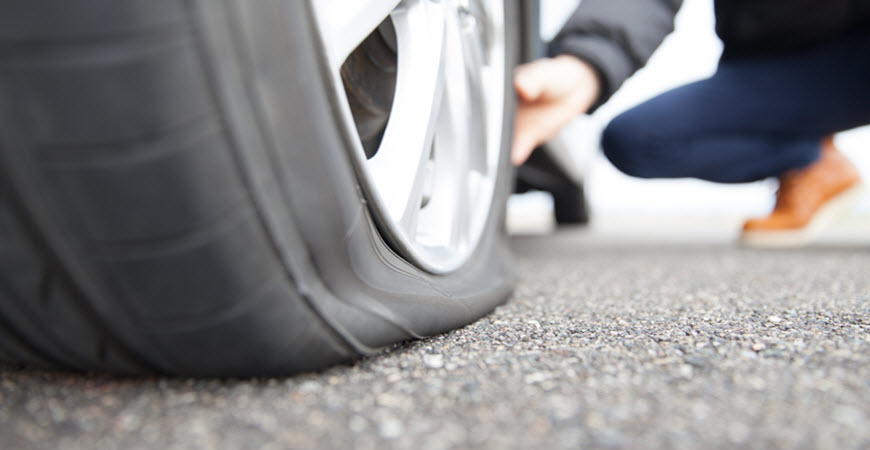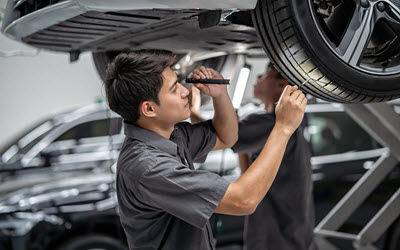- August 1, 2023
- By Cerebro Marketing
- In BMW Repair
- Tags BMW Flat Tire, BMW Flat Tire Fix, BMW Tire Maintenance
- 220
- 0

Your BMW’s tires are designed to work in tandem with the suspension, braking, and steering systems, all of which rely on the proper inflation and overall condition of the tires to function optimally. When a tire loses air pressure or goes completely flat, it disrupts this balance and can lead to compromised handling, decreased fuel efficiency, and even potential damage to other components of your car.
Understanding the causes of flat tires is essential for both prevention and effective response when faced with this inconvenience. Here are the primary causes of flat tires:
Punctures are perhaps the most recognizable culprits behind flat tires. These occur when sharp objects like nails, screws, glass shards, or even metal debris littering the road penetrate the tire’s rubber surface. These foreign objects create small holes that allow air to escape gradually, leading to a loss of tire pressure. In more severe cases, a sudden puncture can cause rapid deflation, resulting in an unexpected and potentially dangerous situation for drivers. To minimize the risk of punctures, avoid debris-strewn roads.
Maintaining proper tire pressure is crucial for the safe and efficient operation of your BMW. When a tire is underinflated—meaning it doesn’t have the recommended amount of air pressure—it can lead to increased friction between the tire and the road. This heightened friction generates excess heat, which can ultimately cause the tire to weaken and may even lead to a blowout. Regularly checking and maintaining your tire pressure can reduce the risk of underinflation-related flat tires.
Exceeding your BMW’s weight limit places undue stress on the tires, particularly when the vehicle is carrying a heavy load. This additional stress can lead to accelerated tire wear and even result in a flat tire. Overloading affects the tires’ ability to properly distribute weight and manage forces during driving, making them more susceptible to failure.
Valve stems are the small, often overlooked components that help maintain proper tire pressure by sealing the air inside the tire. Over time, these valve stems can become damaged due to wear, corrosion, or external factors. When a valve stem is compromised, it can result in slow leaks, causing the tire to gradually lose air pressure.
Tires are not immune to the effects of time and usage. As they age, the rubber compound deteriorates, becoming more susceptible to punctures and failure. The tread on a tire can also wear down over time and reduce its ability to provide proper traction or grip on the road. Older tires are more likely to experience punctures, blowouts, or other forms of tire failure. Always check the tire tread depth and consider a tire replacement as they approach their recommended lifespan to mitigate flat tire issues.
At Paladin Automotive, we understand the  role that well-maintained tires play in enhancing your BMW’s performance, safety, and longevity. Our dedicated team of experienced mechanics is here to support you in safeguarding your driving experience and ensuring that your vehicle’s tires remain in optimal condition.
role that well-maintained tires play in enhancing your BMW’s performance, safety, and longevity. Our dedicated team of experienced mechanics is here to support you in safeguarding your driving experience and ensuring that your vehicle’s tires remain in optimal condition.
With a commitment to excellence and a wealth of experience, we serve drivers from Spring Valley, Summerlin, and Las Vegas, NV. Whether it’s tire pressure checks, tread depth assessments, or addressing issues like punctures and valve stem damage, we have the expertise and cutting-edge tools to provide comprehensive solutions tailored to your BMW’s needs. Book an appointment with us today.